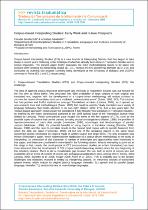Corpus-based interpreting studies: Early work and future prospects
Abstract
This manuscript investigates to what extent the use of corpora could help translation trainees while translating from Arabic into English and vice versa. Forty Yemeni trainees, who were enrolled in an advanced course in Arabic-English translation during the academic year 2020, participated in the study. They participated in translation projects from which the data for this study was collected, using thinking aloud protocols and computational observation. The translation process was investigated using the translation process software Transalog, an eye-tracking software and the screen recording software Screen-O-Matic. This kind of computational observation enabled a researcher to discover the extent to which the participants were able to employ corpora in their translation projects. At the end of the study, the participants were given a questionnaire with the aim of finding out their perceptions toward the use of corpora in their translation projects, and toward the project-based training approach adopted in the study. The findings of the translation process indicated that the trainees employed various kinds of corpora in their translation projects. Results from the questionnaire showed that the trainees have very positive attitudes toward the progress in their instrumental translation sub-competence, the utilization of corpora tools, and the project-based training approach adopted in this study.

